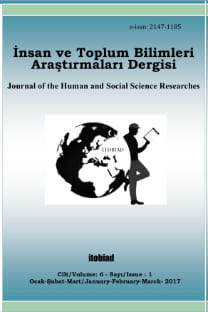Brezilya ve Arjantin’de İş Dünyasının Demokratikleşmeye Bakışları
Demokratikleşme; Siyasi Rejim Değişikliği; İş Dünyası; Demokrasiye Geçiş; Karşılaştırmalı Vaka Çalışması; Brezilya; Arjantin
Business Views of Democratization in Brazil and Argentina
___
- Acuna, Carlos H. 1995. “Business Interests, Dictatorship, and Democracy in Argentina” in Ernest Bartell and Leign Payne (Eds), Business and Democracy in Latin America, Pittsburgh: University of Pittsburgh Press
- Acuna, Carlos H. 1998. “Political Struggle and Business Peak Associations: Theoretical Reflections on the Argentine Case” in Francisco Durand & Eduardo Silva (Eds), Organized Business, Economic Change, Democracy in Latin America, Miami: North-South Center Press
- Bellin, Eva 2000. “Contingent Democrats: Industrialists, Labor, and Democratization in Late-Developing Countries”, World Politics 52 (January): 175-205
- Cardoso, F.H. 1979. “On the Characterization of Authoritarian Regimes in Latin America” in David Collier (Ed) The New Authoritarianism in Latin America, Princeton, NJ: Princeton University Press
- Collier, David 1979. “Overview of the Bureaucratic-Authoritarian Model” in David Collier (Ed), The New Authoritarianism in Latin America, Princeton, NJ: Princeton University Press
- E. Silva & F. Durand 1998. “Organized Business and Politics in Latin America” in Francisco Durand & Eduardo Silva (Eds), Organized Business, Economic Change, Democracy in Latin America, Miami: North-South Center Press
- Erickson, Kenneth P. 1977. The Brazilian Corporative State and Working-Class Politics, Berkeley: University of California Press
- Gibson Edward 1989, “Nine Cases of the Breakdown of Democracy” in Robert A. Pastor 1989, Democracy in the Americas: Stopping the Pendulum, New York: Holmes & Meier Publications
- Gibson, Edward 1996. Class and Conservative Parties: Argentina in Comparative Perspective, Baltimore: The John Hopkins University Press
- Levitsky, Steven 2005. “Argentina: Democratic Survival amidst Economic Failure” in Frances Hagopian & Scott Mainwaring (Eds) 2005, The Third Wave of Democratization in Latin America, New York: Cambridge University Press
- Lipset, S.M. 1959. “Some Social Requisites of Democracy: Economic Development and Democracy”, American Political Science Review
- Mauceri, Philip 1989. “Nice Cases of Transitions and Consolidation” in Robert A. Pastor 1989, Democracy in the Americas: Stopping the Pendulum, New York: Holmes & Meier Publications
- Moore, Barrington 1966. Social Origins of Dictatorship and Democracy, Boston: Beacon Press
- Payne, Leigh A. 1994. Brazilian Industrialists and Democratic Change, Baltimore: The John Hopkins University Press
- Payne, Leigh A. 1995a. “Brazilian Business and the Democratic Transition: New Attitudes and Influence” in Ernest Bartell and Leign Payne (Eds), Business and Democracy in Latin America, Pittsburgh: University of Pittsburgh Press
- Payne, Leigh H. 1995b. “Bringing Business Back In: Business-State Relations and Democratic Stability in Latin America” in Ernest Bartell and Leign Payne (Eds), Business and Democracy in Latin America, Pittsburgh: University of Pittsburgh Press
- Rueschemeyer, Dietrich et al 1992. Capitalist Development and Democracy, Chicago: University of Chicago Press
- Scott Mainwaring & Anibal Perez-Linan 2005, “Latin American Democratization since 1978: Democratic Transitions, Breakdowns, and Erosions” in Frances Hagopian & Scott Mainwaring (Eds), The Third Wave of Democratization in Latin America, New York: Cambridge University Press
- Serra, Jose 1979. “Three Mistaken Theses Regarding the Connection between Industrialization and Authoritarian Regimes” in David Collier (Ed) The New Authoritarianism in Latin America, Princeton, NJ: Princeton University Press
- Wairda, Howard J. 2004. Authoritarianism and Corporatism in Latin America: Revisted, Gainesville, FL: University Press of Florida
- Weyland, Kurt 2005. “The Growing Sustainability of Brazil’s Low-Quality
- Democracy” in Frances Hagopian & Scott Mainwaring (Eds), The Third Wave of Democratization in Latin America, New York: Cambridge University Press
- ISSN: 2147-1185
- Yayın Aralığı: 4
- Başlangıç: 2012
- Yayıncı: Mustafa SÜLEYMAN ÖZCAN
Muhafazakârlık Ve Reform Arasında Bir Hareket: Neolog Yahudilik
Klâsik Türk Şiirinde Kadın Söyleminin İzinde: Şeref Hanım Dîvânı'nda Ninniler
Muhlisî'nin Cem Sultan Mersiyesi
Yaşlılık Döneminde Dini Başaçıkma
Yeni Ekonomide E-ticaretin Yükselişi: Kayıp Halkayı Nijerya’da Bütünlemek
Poetika Kavramı ve Şinasi’nin Poetik Tavrı Üzerine
Gana’da Hane Halkının Fakirliğinde Düşüşe Doğru: Kuzey Gana Eyaleti Bongo’da Kadının Rolü
